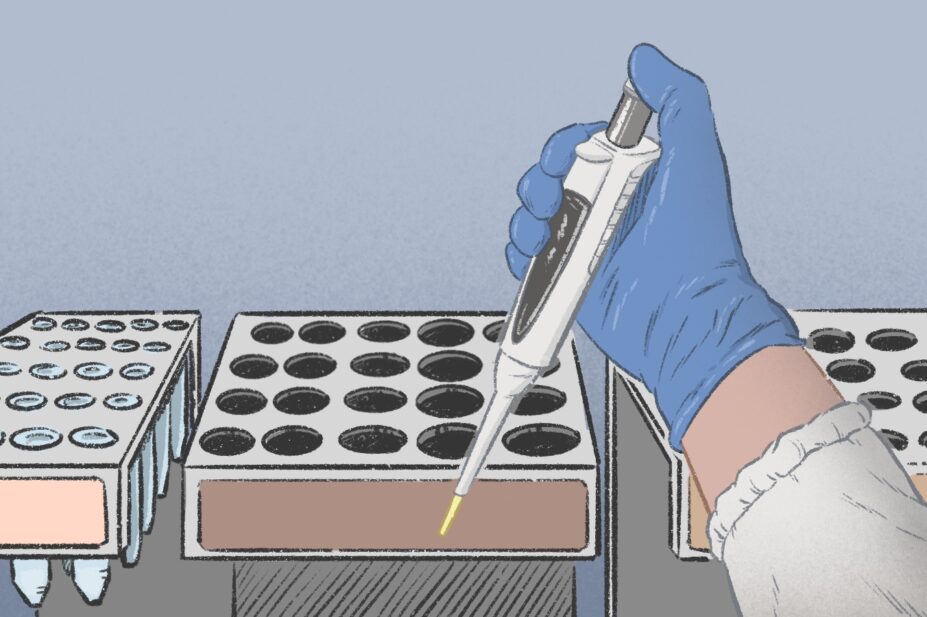
Wes Mountain/The Pharmaceutical Journal
The Pharmaceutical Journal has long championed the use of pharmacogenomics in day-to-day pharmacy practice, declaring it a “revolution” for healthcare in January 2022 and starting a conversation about what the practice could mean for pharmacists on a daily basis.
Not only is that revolution underway — as we signalled in May 2023 with the publication of the ‘PREPARE‘ study results and the start of the ‘PROGRESS‘ trial in primary care — but indications now suggest that the roll out of genomic testing in the UK is moving forward at pace.
According to the latest quarterly data published by NHS England, 809,888 genomic tests were carried out in 2023/2024. While publicly available data only dates back to April 2023, meeting papers published ahead of NHS England’s July board meeting noted that testing had increased by 10% in 2023/2024, compared with 2022/2023.
The quarterly data indicate that this increase has been largely supported by genomic tests related to cancer, which accounted for more than half (434,217) of the tests that year. Between April 2023 and March 2024, the number of tests per month increased by 23%, from 29,594 to 37,175 genomic tests.
Among the tests carried out for people with cancer is a pharmacogenomic test of the DPYD gene, which has been commissioned nationally by the NHS since November 2020. The National Genomic Test Directory, which lists all of the NHS England-commissioned genomic tests, sets out 15 clinical indications for adults and 2 for children that can precipitate a DPYD test. These include breast cancer, colorectal cancer and pancreatic cancer. The only eligibility criterion is that the patient is planned to receive the chemotherapy fluoropyrimidine as treatment.
If inequity is ingrained in the testing protocols, then the barometer of overall population health doesn’t move at all
The test itself screens for four different genetic variants of the DPYD gene. Variations in this gene have been associated with a dihydropyrimidine dehydrogenase (DPD) enzyme deficiency, making it difficult or impossible for the patient to break down the fluoropyrimidine treatment.
For patients with one of the genetic variations, this means that proceeding with fluoropyrimidine could cause fatal toxicity. Clearly, an effective DPYD test is a crucial part of treatment.
The problem, however, is that the test is not effective for everyone.
An NHS policy statement says most of the evidence that supports testing for these four DPYD variants is linked to white Caucasian populations and researchers are now suggesting that a fifth variant, often found in African populations, be tested for as well.
The research, published in the British Journal of Cancer in July 2024, looked at 32 studies published between 1998 and 2022, which covered 53 DPYD genetic variants found in patients from 12 countries and 5 ethnic groups: African American, East Asian, Latin American, Middle Eastern and South Asian.
Researchers concluded “that it would be important to extend DPYD genetic testing in the UK NHS to include the c.557A>G variant, which has been identified in individuals of African ancestry”.
Doing so would “make sure we are not exacerbating health inequalities,” according to study author Sir Munir Pirmohamed, NHS chair of pharmacogenetics at the University of Liverpool.
Exacerbating health inequalities is a significant risk to the genomic revolution and one that the NHS needs to get a handle on from the outset.
Genetic testing ahead of clopidogrel treatment for preventing blood clots is another pertinent example. In July 2024, the National Institute for Health and Care Excellence (NICE) published final guidance recommending the use of CYP2C19 genotype testing to assess if clopidogrel is a suitable antiplatelet drug for people who have just had an ischaemic stroke or a transient ischaemic attack. The drug relies on the CYP2C19 enzyme to be converted into its active metabolite in the bloodstream.
Having a genetic variation that renders clopidogrel ineffective is strongly linked to ethnicity. For this reason, NICE advises the use of laboratory-based testing because they are able to test for a wider range of variations, compared with point-of-care tests (POCTs), which may disproportionately fail to identify variations “in certain ethnic groups”.
The issue here is one of capacity. As the NICE guidance suggests, the NHS doesn’t currently have enough clinical scientists to run the tests. The genomics workforce is set to expand over the next three to five years as part of the ‘NHS long-term workforce plan’, but in the meantime, clinicians will meet demand with second-choice POCTs, if the other option is no test at all.
The whole point of pharmacogenomics is that it provides the opportunity to level the playing field when it comes to the efficacy of medicines. Each patient will get the medicine that’s right for them. But if inequity is ingrained in the testing protocols, then the barometer of overall population health doesn’t move at all.
To make real progress — outside of rising test numbers on paper — the NHS must keep health equity at the forefront and address any risk of exacerbated inequalities without delay. PJ


